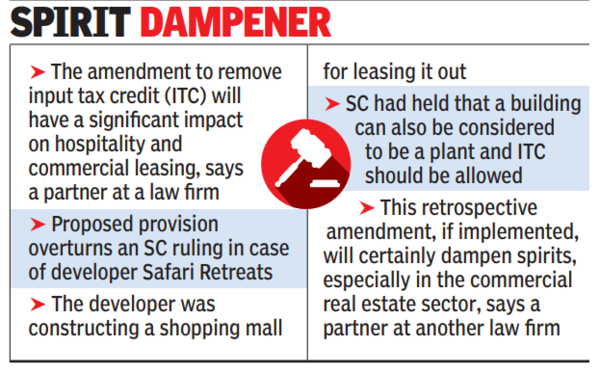MUMBAI: Availability of credit for taxes paid on inputs – be it goods, such as raw material, or services for setting off against Goods and Services Tax (GST) liability plays an important role in the GST arena. Input tax credit (ITC) helps reduce the tax outgo for the GST payer.
A retrospective amendment, which comes into effect from July 1, 2017, debars entities, such as commercial real estate companies from claiming ITC on construction costs for their rental buildings.
Rohit Jain, deputy managing partner, at Economic Laws Practice said, “The proposed amendment restricts the eligibility of ITC of goods and services used for construction of immovable property on ‘one’s own account’, such as building, warehouses and any other civil structure. The amendment has a significant impact on hospitality and commercial leasing activities.”
Any retrospective amendment denying the benefit to taxpayers at large is never received well by the industry and is viewed as a retrograde and regressive step. The same is against the spirit of stability and predictability and has the potential to woo away the investors, added Jain.

The proposed provision overturns a SC judgement in the case of Safari Retreats, a real estate developer, who was constructing a shopping mall for leasing it out. The SC had held that a building can also be considered to be a plant and ITC should be allowed.
A slight difference in terminology matters a lot in tax laws. Section 17 (5) of the GST Act defines a list of purchases (inputs) on which GST is paid, but the buyer cannot claim ITC. The SC had distinguished between the words plant ‘or’ machinery used in this section from the term plant ‘and’ machinery. The budget retrospectively replaces the wording ‘plant or machinery’ with the words ‘plant and machinery’ – following a recommendation of the GST council.
Sudipta Bhattacharjee, indirect tax partner at Khaitan & Co said, “This retrospective amendment, if implemented, will certainly dampen spirits, especially in the commercial real estate sector in India. But, this amendment only deals with one of the two favourable conclusions of the Supreme Court in the Safari Retreats case. The legal arguments based on the Supreme Court’s interpretation of ‘construction by the taxpayer on his own account’ will remain untouched and undiminished by this retrospective amendment. This may be strongly relied upon by business in commercial real estate or infrastructure space to avail input tax credit.”
“In the past SC decisions have affirmed that vested rights accrued in favour of a taxpayer cannot be retrospectively revoked through an amendment. On this ground, the possibility of taxpayers challenging the budget proposal cannot be ruled out,” said Jain.
